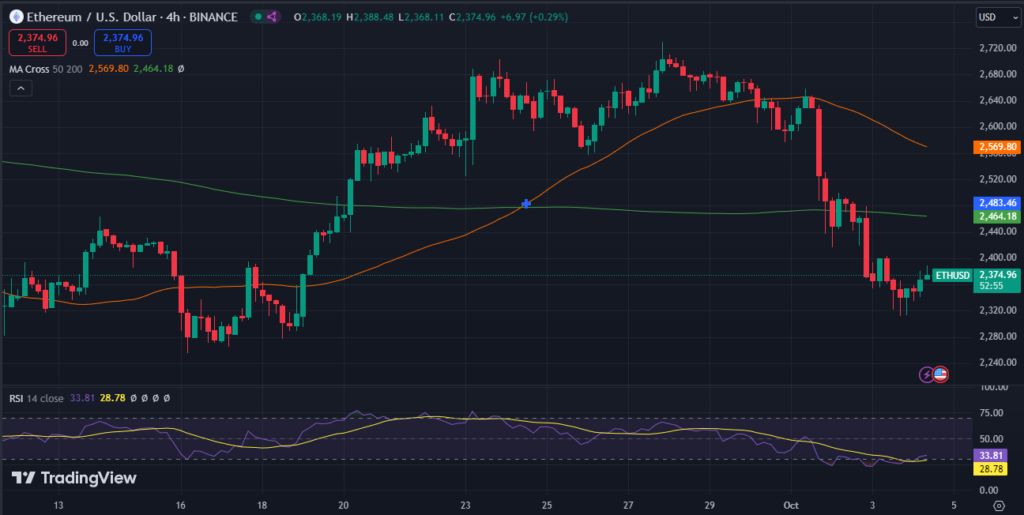- Ethereum (ETH) price has dropped about 12.73% in October, from $2,648 to $2,311.
- Ethereum reserves increased by 186,000 ETH in 24 hours, signaling rising selling pressure and mixed sentiment.
Despite positive news surrounding Franklin Templeton’s proposed Bitcoin and Ethereum index ETFs, Ethereum (ETH) and Bitcoin (BTC) display price declines. As October begins, often referred to as “Uptober” for its historical bullish trends, market sentiment remains cautious, with both leading cryptocurrencies struggling to maintain momentum.
Currently, ETH is trading around $2,383 after dipping to a low of $2,311. Since October 1, it has lost approx. 12.73%, falling from a high of $2,648. While it remains above the crucial $2,300 support level, a drop below this point could send it toward the $2,100 range or even below $2,000.
Investor sentiment has shifted to a more cautious stance, evident from a rise in Ethereum exchange reserves. Data from CryptoQuant shows an increase of over 186,000 ETH in exchange reserves in just 24 hours, indicating growing selling pressure.
At present, the Ethereum price is down nearly 0.33% for the day. Over the past 24 hours, ETH has experienced liquidations exceeding $44.89 million, with long positions of $34.93 million and short positions accounting for $9.96 million.
Further, Ethereum ETFs recorded a net outflow of $3.20 million on Thursday. Although BlackRock’s ETHA saw an inflow of $12.08 million, it wasn’t enough to counter the $14.69 million outflow from Grayscale’s ETHE. Historically, Ethereum ETFs have struggled to match the performance of their Bitcoin counterparts.
Is Ethereum’s Price Decline Pointing to Bearish Trends?
Despite the initial optimism for October, Ethereum began the month on a low note, breaking below the support level of $2,350. It has also crossed below its 50-day and 200-day moving averages, signaling potential bearish trends. The next support level to watch is $2,280, and a breach here could lead to a further decline toward $2,200.

The Stochastic RSI for Ethereum shows an overbought condition, with selling pressure increasing as the Relative Strength Index (RSI) sits at 33. This suggests a potential reversal as it approaches oversold levels. However, recovering above the $2,550 level could help invalidate the current bearish outlook.








